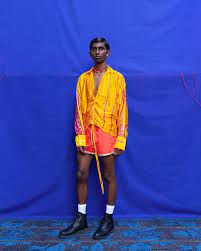Meet Amesh Wijesekera, the Designer Taking Sri Lanka, Berlin, and Now the World by Storm
In the flurry of IRL and URL events, shows, and appointments, one can easily gloss over diamonds in the rough. But even in a chaotic phygital fashion month, Amish Wijesekera’s work stands out. The Sri Lankan designer is the first winner of Reference Studios’s Reference Incubator prize and presented his work at the phygital Reference Festival in Berlin earlier this autumn alongside 032c, Ottolinger, Juliana Huxtable, and more renown artists, musicians, and designers.
“He’s the first winner and he is also exactly what we have
been looking for; he represents every single aspect of the program when we
first set together with Hans Ulrich Obrist three years ago,” said Reference
Studios founder Mumi Haiati. “What we had in mind was to really support and
enable underrepresented talent from around the world with a sustainable approach
as a foundation. I think he represents
just that.”
Wijesekera’s collection tackles ideas that mainstream
fashion wrestles with—identity, multiculturalism, sustainability, and
gender—with beautiful and emotional strength. He spent much of 2020’s lockdowns
in Sri Lanka with his family, using the experience to fuel a new creative
process. “I was kind of stuck at home, but then I started cleaning up and found
all my mom’s saris. They had been there for all these years in her cupboard and
she would wear them like once a year, [and they were] like rotting away. I
thought, let’s use what’s around me,” he said. “So I cut up all my mom’s saris
and turned them into more tailored pieces.” Wijesekera also restored some of
his grandmother’s saris, adding embroidery and hand-painting, in other pieces.
Because of the pandemic, many of Sri Lanka’s artisans and
factories were also suffering. Wijesekera notes that the country, a massive
manufacturing hub for fashion, has also become a repository for its waste, with
companies sending tons of textile waste to the island. His solution was to work
with artisans on creating one-of-a-kind knits. “Sometimes I feel like the
artisans are treated like machines,” he says. “They have years and years of
knowledge, craftsmanship, and skill, and they never get to show their
creativity or skill. I would give them a rough idea, but I said there is no
right or wrong way to make it.” The collection was then modeled by local Sri
Lankans who Wijesekera scouted on Instagram.
With the support of Reference Studios and its partner Slam
Jam, Wijesekera’s reach is going well beyond Sri Lanka. As the winner of the
Reference Incubator prize, he will receive three months of P.R. assistance, a
spot in Reference Studios’s showroom, and all the resources Slam Jam has to
offer. Plus, there was his virtual inclusion in the Reference Festival
alongside other designers and artists like Ottolinger, Juliana Huxtable, 032C,
and techno musician Max Kobosil’s new collection in partnership with Antonioli
44 Label Group. “We were very happy this year to build a bridge between fashion
week and the art week [in Berlin],” says Haiati, “There has always been a distance
between the different worlds, but for us, they belong together and they can
nourish each other.” The same could be said for the divide between local and
global fashion, but thanks to a flurry of international support, Wijesekera
seems poised to make it wherever he wants to set up shop.
Source Vogue










No comments